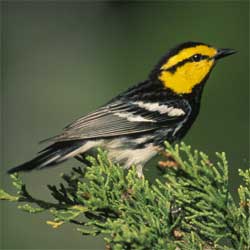 Humans are not the only ones feeling the change of the climate, according to a new study released by U.S. Interior Secretary Ken Salazar called The State of the Birds: 2010 Report on Climate Change. Collaborating with experts from the nation’s leading conservation organizations, the U.S. Fish and Wildlife Service reported that climate change has and will continue to have a devastating effect on bird species in all habitats.
Humans are not the only ones feeling the change of the climate, according to a new study released by U.S. Interior Secretary Ken Salazar called The State of the Birds: 2010 Report on Climate Change. Collaborating with experts from the nation’s leading conservation organizations, the U.S. Fish and Wildlife Service reported that climate change has and will continue to have a devastating effect on bird species in all habitats.
“For well over a century, migratory birds have faced stresses such as commercial hunting, loss of forests, the use of DDT and other pesticides, a loss of wetlands and other key habitat, the introduction of invasive species, and other impacts of human development,” Salazar said. “Now they are facing a new threat–climate change–that could dramatically alter their habitat and food supply and push many species towards extinction.”
The State of the Birds reports on oceanic, coastal, wetlands, islands, aridlands, grasslands and forest birds. These findings include observations and predictions, their vulnerability and potential impacts.
Key findings from the report include:
- Oceanic birds are among the most vulnerable species because they don’t raise many young each year; they face challenges from a rapidly changing marine ecosystem; and they nest on islands that may be flooded as sea levels rise. All 67 oceanic bird species, such as petrels and albatrosses, are among the most vulnerable birds on Earth to climate change.
- For bird species that are already of conservation concern such as the golden-cheeked warbler (which only nests right here in Central Texas), whooping crane, and spectacled eider, the added vulnerability to climate change may hasten declines or prevent recovery.
- The report identified common bird species such as the American oystercatcher, common nighthawk, and northern pintail that are likely to become species of conservation concern as a result of climate change.
State agencies and conservation organizations are provided with alternative solutions to assist with the local bird population in their area.
“While there is much to be concerned about in this report, we can reduce the impact of climate change by taking immediate action to reduce carbon emissions and find creative conservation solutions to help birds adapt to the changes that are already in process,” said David Pashley, vice president of the American Bird Conservancy.
It is important to remember that we share this environment with other species. It is our responsibility to protect the natural world around us. Not only for us but for our future generation.
###
By promoting cleaner energy, cleaner government, and cleaner air for all Texans, we hope to provide for a healthy place to live and prosper. We are Public Citizen Texas.


